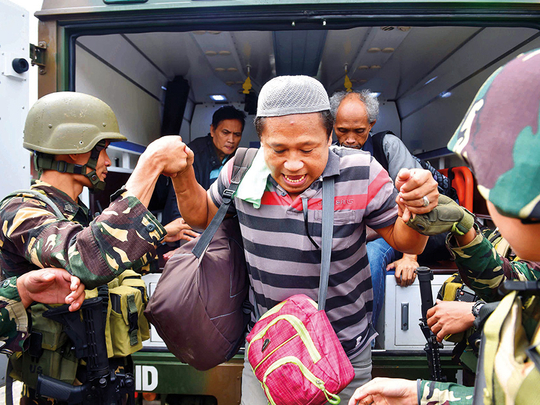
Manila: Hundreds of gunmen attacked troops in a southern Philippine village on Wednesday in a hit-and-run assault that may have been intended to help Islamist militants engaged in a nearby urban war, authorities said.
Five civilians who were used as human shields were missing, and soldiers were pursuing the assailants who had quickly retreated, military spokesman Brigadier General Restituto Padilla told reporters in Manila.
The Philippine military said militants who had holed up in a primary school in the south early on Wednesday had retreated after a gun battle with troops but were holding some civilians hostage.
There was no word of casualties in the incident at Pigcawayan town, which is about 190 kilometres south of Marawi City, where fighting between government troops and pro-Islamic State militants has entered its fifth week.
No students were taken hostage at the school, said Padilla, discounting reports that some children were being held. He said the militants had retreated from the school and troops were chasing them.
Another military spokesman, Captain ARVIN Encinas, said the militants, who call themselves the Bangsamoro Islamic Freedom Fighters (BIFF), were holding some civilians hostage, but he was not sure how many.
“Definitely, they are holding hostages, that’s why our soldiers are having difficulty because they are using them as human shields,” Encinas said.
Police said about 300 armed men stormed the school early on Wednesday. Encinas, however, said later only 30 militants were involved.
Abu Misry Mama, a spokesman for the BIFF, told journalists that the militants had taken civilians to a place safe, away from any crossfire, and did not intend to hold them hostage.
Asked if they would be freed, Mama said: “Yes. We’re not kidnappers.” Padilla said the incident at Pigcawayan was not related to the fighting in Marawi. “This has come from a group that has long committed harassment,” he said.
Padilla said the gunmen attacked a military outpost at daybreak in Pigkawayan, a farming town about 160 kilometres from Marawi city where fighters linked to the Daesh group have been battling troops for a month.
The attack could be a diversionary tactic to ease pressure on the militants in Marawi, local police commander Chief Inspector Realan Mamon said on radio.
Padilla said the attackers belonged to the Bangsamoro Islamic Freedom Fighters (BIFF), one of four armed groups in the southern Philippine region of Mindanao that analysts say have pledged allegiance to Daesh.
He said the gunmen attacked the lightly defended outpost, then exchanged fire with troops.
“It’s already resolved. The enemy has withdrawn ... they failed,” Padilla said, adding that troops were in pursuit of the militants.
Local authorities initially reported the gunmen had occupied a school before students arrived.
But Padilla made no mention of any incident at the school.
The area around Pigkawayan is made up of marshlands, mountains and farmlands.
Padilla said there were no confirmed casualties but the military had yet to locate the five people initially used as human shields.
Pigkawayan town mayor Eliseo Garsesa said about 200 gunmen were involved, while a police report said there were about 300.
Padilla said the BIFF, a small insurgent group believed to have just a few hundred fighters, had seemingly sought to capitalise on the military being focused on the Marawi war.
“By and large they are just taking advantage ... of the situation that we have a very slightly defended outpost and that they think our forces are elsewhere in the province,” Padilla said.
Muslim rebels have been fighting for more than four decades for an independent or autonomous region in the south of the mainly Catholic nation, with the conflict claiming more than 120,000 lives.
The major rebel organisations have signed, or are pursuing, peace deals with the government, but small hardline groups such as the BIFF have vowed to continue fighting.
Philippine President Rodrigo Duterte declared martial law across the southern region of Mindanao on May 23 immediately after fighters flying the Daesh flag rampaged through Marawi.
Their assault on Marawi ignited an unprecedented urban war that has claimed hundreds of lives and which Duterte has warned is part of a Daesh campaign to establish a base in Mindanao.
The fighting has left Marawi, the most important Muslim city in the Philippines, largely in ruins.
The militants involved in the Marawi fighting are mostly from the Maute and Abu Sayyaf organisations, which have united with the BIFF under the Daesh umbrella, according to the government.
The military has said foreign fighters, including those from Chechnya, Indonesia and Malaysia, have also joined the Marawi conflict.
Daesh has ambitions of setting up a caliphate in Southeast Asia — home to largely Muslim nations like Indonesia and Malaysia — as the group loses territory in Iraq and Syria.
Garsesa, the town mayor, said local authorities had received text messages over the past several days about an attack somewhere in the area.
The BIFF was blamed for attacking at least nine Mindanao towns in 2008, with the assaults claiming about 400 lives and forcing 600,000 people to flee their homes.












